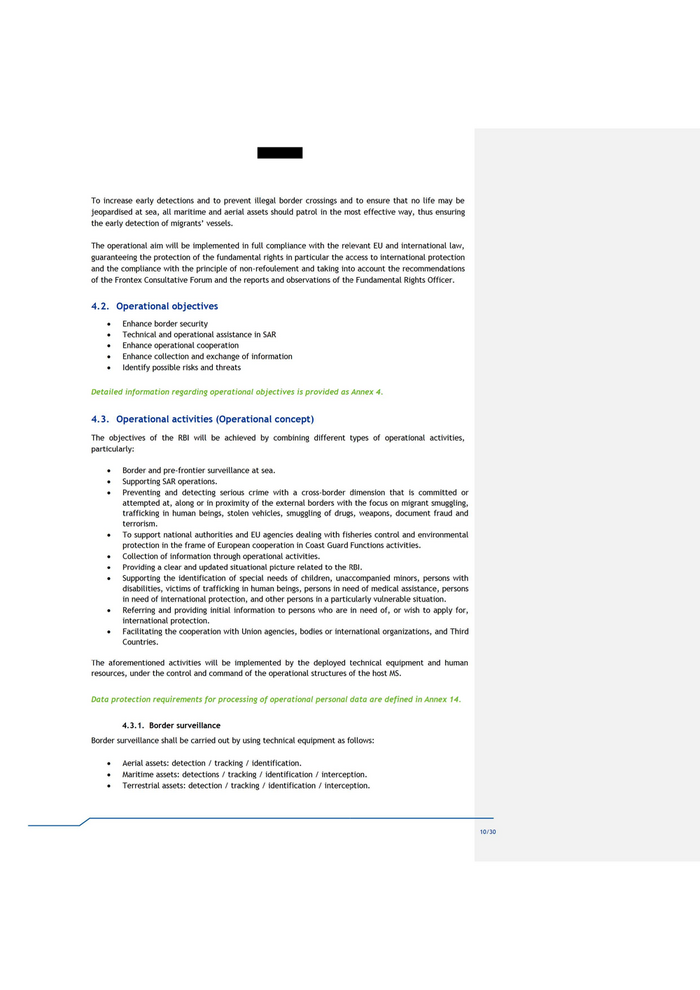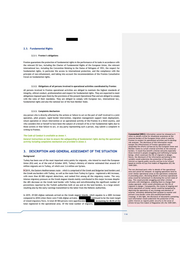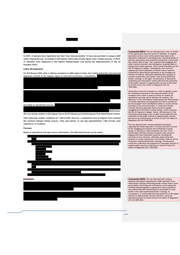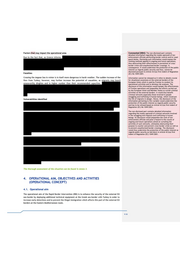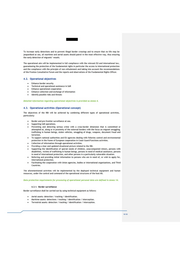imported-pad-2022-00022-documents2
Dieses Dokument ist Teil der Anfrage „Documents regarding RBI Aegean“
ZS FRONTEX EI EUROPEAN BORDER AND COAST GUARD AGENCY Warsaw, 30/06/2020 Operational Plan (Main part) Amendment No. 3 RAPID BORDER INTERVENTION AEGEAN 2020 This document is not to be disclosed to any third party without the prior consent of the European Border and Coast Guard Agency (Frontex) Approved by ü A Frontex - European Border and Coast Guard Agency www.frontex.europa.eu | Pl. Europejski 6, 00-844 Warsaw, Poland | Tel. +48 22 205 95 00 | Fax +48 22 205 95 01 1/30


INDEX Contents 1. INTRODUCTION 5 2. LEGAL FRAMEWORK 5 2.1. Frontex 5 2.2. EU and international law 6 2.3. Fundamental Rights 7 3. DESCRIPTION AND GENERAL ASSESSMENT OF THE SITUATION 7 4. OPERATIONAL AIM, OBJECTIVES AND ACTIVITIES (OPERATIONAL CONCEPT) 9 4.1. Operational aim 9 4.2. Operational objectives 10 4.3. Operational activities (Operational concept) 10 5. IMPLEMENTATION 14 5.1. Period of implementation 14 5.2. Operational areas 15 5.3. Host and Participating Member States, third countries, other Union bodies, offices and agencies or international organisations 15 5.4. Operational briefings / debriefings 15 6. COOPERATION WITH THIRD COUNTRIES, OTHER UNION BODIES, OFFICES AND AGENCIES OR INTERNATIONAL ORGANIZATIONS 15 6.1. Cooperation with third countries 13 6.2. Cooperation with other Union bodies, offices and agencies or international organizations 16 7. COORDINATION STRUCTURE 16 7.1. Partnership 16 7.2. Main operational structures / actors and their tasks 16 7.3. _Coordination of the contingents deployed by the Member States 17 8. COMMAND AND CONTROL 18

8.1. Technical equipment 8.2. European Border and Coast Guard Teams (Team Members and other relevant staff) 8.3. Command and control scheme 9. COMMUNICATION 9.1. Operational communication 9.2. Communication with Press 10. REPORTING 10.1. Reporting in JORA 10.2. Operational reports of participants 10.3. Daily reporting package 10.4. Serious incident reporting 10.5. Frontex reports 11. WORKING CONDITIONS AND LOGISTICS 11.1. Working conditions and working environment of the operational area 11.2. Working time 11.3. Safety and health 11.4. Logistics 12. EVALUATION 12.1. Member States and Third Countries 12.2. Frontex 13. FINANCIAL PROVISIONS 14. CONTACT DETAILS ANNEXES 18 18 18 19 19 20 20 20 21 22 22 23 24 24 25 26 28 28 29 29 29 30 4/30

1. INTRODUCTION This Operational Plan, composed of the Main part and Annexes, was agreed with the authorities of the host Member State? (MS). After receiving a request from Greece on 01/03/2020, pursuant to Article 37(2) of the European Border and Coast Guard Regulation (hereinafter the “Regulation’), the Frontex Executive Director decided to launch on 2 March 2020 a Rapid Border Intervention in order to enhance the security of the EU sea external borders. The aim of the activity is to provide an additional technical support for the maritime surveillance in order to tackle the specific and disproportionate challenges related to illegal immigration in Greece. The deployment of the Rapid Border Intervention does not replace the support provided to Greece by the ongoing JO Poseidon 2020, which will continue as planned. The Rapid Border Intervention focuses on the maritime border surveillance while the support to migration management and debriefing activities are regulated in the OPLAN of the JO Poseidon 2020. The Operational Plan, marked as Following its approval the Operational Plan shall be immediately distributed by Frontex to the host and participating MS via Frontex-One-Stop-Shop (FOSS). The Operational Plan may be amended in order to correspond with the new operational developments of the exceptional circumstances justifying the Rapid Border Intervention. Updates related to the participation in the rapid border intervention (Main part, chapter 5.3.) and the Initial Plan of Deployed Resources (Annex 7) are not deemed amendments to the Operational Plan. The Handbook referred to in the Operational Plan contains the guidelines and complementary information in regard to Frontex operational activities, services and products, reporting platforms and other joint maritime operations’ related matters. References to the Handbook are made in the Main part and Annexes of the Operational Plan. Handbook to the Operational Plan is uploaded on FOSS. 2. LEGAL FRAMEWORK 2.1. Frontex The European Border and Coast Guard Agency (‘Frontex’), based on the Regulation, ensures, together with national authorities responsible for border management, including coast guards to the extent that they carry out border control tasks, the effective implementation of European integrated border management with a view to managing the crossing of external borders efficiently. Frontex is responsible for organising the appropriate technical and operational assistance for the EU Member States including assist Member States in circumstances requiring increased technical and operational assistance at the external borders by launching rapid border interventions at the external borders of those Member States facing specific and disproportionate challenges, taking into account that some situations may involve humanitarian emergencies and rescue at sea in accordance with Union and international law. Based on the request of a 2 For the purposes of the present document, the term “Member State” includes also the States participating in the relevant development of the Schengen acquis in the meaning of the Treaty on the Functioning of the European Union and its Protocol (No 19) on the Schengen acquis integrated into the framework of the European Union, that is, Norway, Iceland, Liechtenstein, and Switzerland. Teen 5/30

Member State faced with a situation of specific and disproportionate challenges the Agency may deploy a rapid border intervention by deploying European Border and Coast Guard teams and technical equipment at the external borders. Regulation prescribes that Frontex shall provide technical and operational assistance to Member States and third countries, in support of search and rescue operations for persons in distress at sea which may arise during border surveillance operations at sea. The main legal framework, objectives, tasks and responsibilities of Frontex are laid down in the European Border and Coast Guard Regulation. 2.2. EU and international law The following non-exhaustive legal framework applies to the implementation of the activities foreseen in the present Operational Plan: « Regulation (EU) 2019/1896 of the European Parliament and of the Council of 13 November 2019 on the European Border and Coast Guard and repealing Regulations (EU) No 1052/2013 and (EU) 2016/1624. «e Regulation (EU) 2016/399 of the European Parliament and of the Council of 9 March 2016 on a Union Code on the rules governing the movement of persons across borders (Schengen Borders Code). *® Regulation (EU) 656/2014, of the European Parliament and of the Council of 15 May 2014 establishing rules for the surveillance of the external sea borders in the context of operational cooperation coordinated by the European Agency for the Management of Operational Cooperation at the External Borders of the Member States of the European Union. «e Regulation (EU) 2016/679 of the European Parliament and of the Council of 27 April 2016 on the protection of natural persons with regard to the processing of personal data and on the free movement of such data, and repealing Directive 95/46/EC (General Data Protection Regulation). «e Regulation (EU) 2018/1725 of the European Parliament and of the Council of 23 October 2018 on the protection of natural persons with regard to processing of personal data by the Union institutions, bodies, offices and agencies and on the free movement of such data, and repealing Regulation (EC) No 45/2001 and Decision No 1247/2002/EC. « _Directive 2016/680/EU of the European Parliament and of the Council of 27 April 2016 on the protection of natural persons with regard to the processing of personal data by competent authorities for the purposes of the prevention, investigation, detection or prosecution of criminal offences or the execution of criminal penalties, and on the free movement of such data, and repealing Council Framework Decision 2008/977/JHA. « _Directive 2013/32/EU of the European Parliament and of the Council of 26 June 2013 on common procedures for granting and withdrawing international protection. e The EU Charter of Fundamental Rights. e The United Nations Convention on the Law of the Sea. « The International Convention for the Safety of Life at Sea. * The International Convention on Maritime Search and Rescue. e The United Nations Convention against Transnational Organized Crime and its Protocol against the Smuggling of Migrants by Land, Sea and Air. ® The United Nations Convention relating to the Status of Refugees. « The European Convention for the Protection of Human Rights and Fundamental Freedoms. e The International Covenant on Civil and Political Rights. e The United Nations Convention against Torture and Other Cruel, Inhuman or Degrading Treatment or Punishment. «e The United Nations Convention on the Rights of the Child. ® The United Nations Convention against Illicit Traffic in Narcotic Drugs and Psychotropic Substances. e _ Convention for the Suppression of Unlawful Acts against the Safety of Maritime Navigation. 6/30

2.3. Fundamental Rights 2.3.1. Frontex’s obligations Frontex guarantees the protection of fundamental rights in the performance of its tasks in accordance with the relevant EU law, including the Charter of Fundamental Rights of the European Union, the relevant international law, including the Convention Relating to the Status of Refugees of 1951, the respect for fundamental rights, in particular the access to international protection, and the compliance with the principle of non-refoulement, and taking into account the recommendations of the Frontex Consultative Forum on fundamental rights. 2.3.2. Obligations of all persons involved in operational activities coordinated by Frontex All persons involved in Frontex operational activities are obliged to maintain the highest standards of integrity, ethical conduct, professionalism and respect for fundamental rights. They are expected to meet obligations imposed upon them by the provisions of the present Operational Plan and are obliged to comply with the rules of their mandates. They are obliged to comply with European law, international law, fundamental rights and also the national law of the host Member State. 2.3.3. Complaints Mechanism Any person who is directly affected by the actions or failure to act on the part of staff involved in a joint operation, pilot project, rapid border intervention, migration management support team deployment, return operation or return intervention or an operational activity of the Frontex in a third country, and who considers him or herself to have been the subject of a breach of his or her fundamental rights due to those actions or that failure to act, or any party representing such a person, may submit a complaint in writing to Frontex. The Code of Conduct is available as Annex 1. General instructions on how to ensure the safeguarding of fundamental rights during the operational activity including complaints mechanism are provided in Annex 2. 3. DESCRIPTION AND GENERAL ASSESSMENT OF THE SITUATION Background Turkey has been one of the most important entry points for migrants, who intend to reach the European Union (EU) and, as of the end of October 2019, Turkey’s Ministry of Interior estimated that around 4.9 million migrants are in Turkey, of which over 3.6 million are Syrians. In 2019, the Eastern Mediterranean route - which is comprised of the Greek and Bulgarian land borders and the Greek sea borders with Turkey, as well as the route from Turkey to Cyprus - registered a 46% increase, with more than 82 000 migrant detections, and ranked first among all the migratory routes. The very intense migratory pressure on the Greek Aegean islands mainly contributed to this major increase despite the 40% decrease on the Greek land border with Turkey and notwithstanding the significant number of preventions reported by the Turkish authorities both at sea and on the land borders, to a large extent resulting also by the early warnings transmitted to the latter from the Hellenic Authorities. In 2019, 29 020 Afghan nationals arrived on the Greek Aegean islands, which equates to a 200% increase compared to 2018 (when there were 9 646 Afghan arrivals). continued to be the main target of mixed migratory flows. In total 28 584 persons were apprehended , accounting for 40.9% of the total registered in the operational area. Of the total number of migrants, 7/30 Commented [KB1]: Information cannot be released as it refers to details crucial for situational awareness at the external borders of the European Union which is used by Frontex to conduct its operational activities and to develop risk analyses. The disclosure of this information would hamper the effectiveness of Frontex operations and jeopardise the efforts carried out by the European Union and Member States to curtail criminal activities at the external borders. It would thus benefit criminal networks especially those involved in people smuggling and trafficking in human beings, which would put the life of migrants in danger. Hence, the disclosure of the information pertaining to this variable would undermine the protection of the public interest as regards public security and has to be refused based on Article 4(1)(a) first indent of Regulation (EC) No 1049/2001. The non-disclosed parts refer to details of the operational area and cannot be released. As ongoing operations tend to cover similar operational areas as the operations conducted in preceding years, disclosing details of previous operational areas would be tantamount to disclosing the current state of play. This would provide smuggling and other criminal networks with intelligence, enabling them to change their modus operandi, which would ultimately put the life of migrants in danger. Consequently, the course of ongoing and future operations of similar nature would be hampered by depriving the operations of any strategy and element of surprise, ultimately defeating their purpose to counter and prevent cross-border crime and unauthorized border crossings. In this light, the disclosure of documents containing such information would undermine the protection of the public interest as regards public security in the sense of Article 4(1)(a) first indent of Regulation (EC) No 1049/2001.

In 2019, 23 persons have reportedly lost their lives whereas another 13 have also perished in January 2020 while crossing the sea. According to IOM reports (which also include figures from Turkish sources), in 2019, 71 fatalities were registered in the Eastern Mediterranean (132 during the implementation of the JO Poseidon 2019). Latest developments On 28 February 2020, after a military escalation in Idlib region in Syria, the Turkish authorities discontinued migration controls in the Aegean region at land and sea borders. Immediately, According to operational sources, the very stormy weather in the Aegean Sea on 28-29 February prevented migrants from departing for Greece. With improving weather conditions on 1 March 2020, however, a substantial wave of migrant flows reached the northern Hotspot Islands (Lesvos, Chios and Samos). In one day approximately 1 500 arrivals were reported in 31 incidents. Forecast Based on operational and open source information, the following forecast can be made: Conclusion| 8/30 Commented [KB2]: The non-disclosed parts refer to details of the operational area and cannot be released. As ongoing operations tend to cover similar operational areas as the operations conducted in preceding years, disclosing details of previous operational areas would be tantamount to disclosing the current state of play. This would provide smuggling and other criminal networks with intelligence, enabling them to change their modus operandi, which would ultimately put the life of migrants in danger. Consequently, the course of ongoing and future operations of similar nature would be hampered by depriving the operations of any strategy and element of surprise, ultimately defeating their purpose to counter and prevent cross-border crime and unauthorized border crossings. In this light, the disclosure of documents containing such information would undermine the protection of the public interest as regards public security in the sense of Article 4(1)(a) first indent of Regulation (EC) No 1049/2001. Information cannot be released as it refers to details crucial for situational awareness at the external borders of the European Union which is used by Frontex to conduct its operational activities and to develop risk analyses. The disclosure of this information would hamper the effectiveness of Frontex operations and jeopardise the efforts carried out by the European Union and Member States to curtail criminal activities at the external borders. It would thus benefit criminal networks especially those involved in people smuggling and trafficking in human beings, which would put the life of migrants in danger. Hence, the disclosure of the information pertaining to this variable would undermine the protection of the public interest as regards public security and has to be refused based on Article 4(1)(a) first indent of Regulation (EC) No 1049/2001. The non-disclosed part contains detailed information regarding the modus operandi of criminal networks involved in the smuggling and migrants and trafficking in human beings. Its disclosure would jeopardize the work of law enforcement officials and pose a hazard to the course of ongoing and future operations aimed at curtailing the activities of such networks, ultimately obstructing their purpose to counter and prevent cross-border crime as well as to prevent unauthorized border crossings. The disclosure would thus undermine the protection of the public interest as regards public security as laid down in Article 4(1)(a) first indent of Regulation (EC) 1049/2001. Commented [KB3]: The non-disclosed part contains detailed information regarding the modus operandi of law enforcement officials performing border control and/or coast guard duties. Disclosing such information would expose the working methods applied in ongoing and future operations, thus obstructing their effectiveness in prevention of cross- border crime and unauthorized border crossings. In consequence, it would undermine the protection of the public interest as regards public security and thus, cannot be disclosed pursuant to Article 4(1)(a) first indent of Regulation (EC) No 1049/2001.
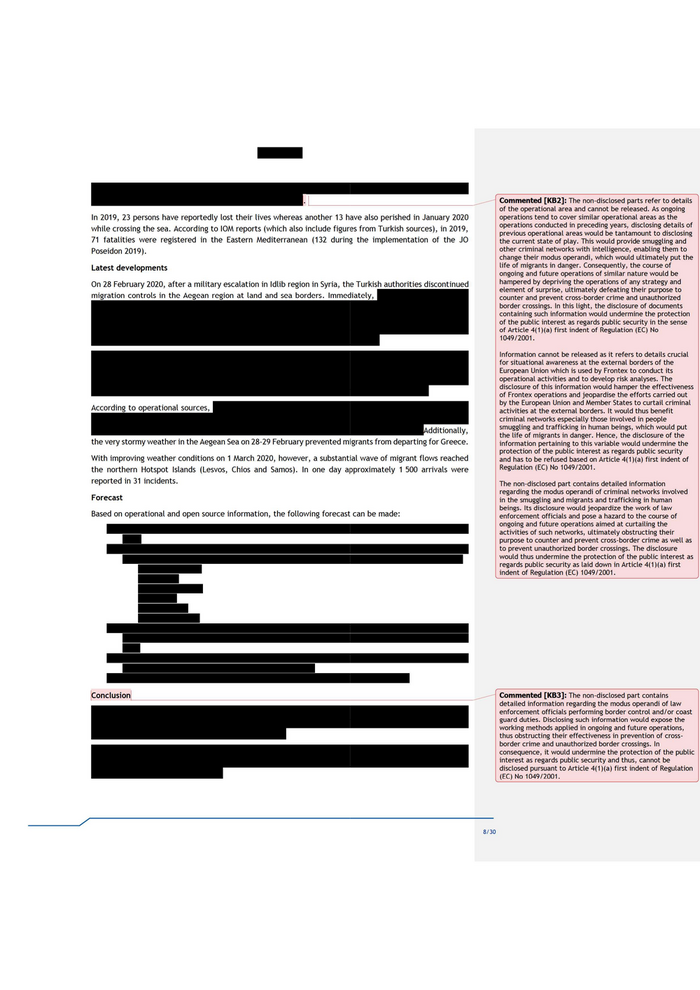
Factors that] may impact the operational area Due to the fact that, as Greece informs, Fatalities Crossing the Aegean Sea in winter is in itself more dangerous in harsh weather. The sudden increase of the flow from Turkey, however, may further increase the potential of casualties, as migrants may board unseaworthy dinghies and in higher number than their recommended capacities. Vulnerabilities identified The thorough assessment of the situation can be found in Annex 3. 4. OPERATIONAL AIM, OBJECTIVES AND ACTIVITIES (OPERATIONAL CONCEPT) 4.1. Operational aim The operational aim of the Rapid Border Intervention (RBl) is to enhance the security of the external EU sea border by deploying additional technical equipment at the Greek sea border with Turkey in order to increase early detections and to prevent the illegal immigration which affects this part of the external EU borders at the Eastern Mediterranean route. 14 9/30 Commented [KB4]: The non-disclosed part contains detailed information regarding the modus operandi of law enforcement officials performing border control and/or coast guard duties. Disclosing such information would expose the working methods applied in ongoing and future operations, thus obstructing their effectiveness in prevention of cross- border crime and unauthorized border crossings. In consequence, it would undermine the protection of the public interest as regards public security and thus, cannot be disclosed pursuant to Article 4(1)(a) first indent of Regulation (EC) No 1049/2001. information cannot be released as it refers to details crucial for situational awareness at the external borders of the European Union which is used by Frontex to conduct its operational activities and to develop risk analyses. The disclosure of this information would hamper the effectiveness of Frontex operations and jeopardise the efforts carried out by the European Union and Member States to curtail criminal activities at the external borders. It would thus benefit criminal networks especially those involved in people smusggling and trafficking in human beings, which would put the life of migrants in danger. Hence, the disclosure of the information pertaining to this variable would undermine the protection of the public interest as regards public security and has to be refused based on Article 4(1)(a) first indent of Regulation (EC) No 1049/2001. The non-disclosed part contains detailed information regarding the modus operandi of criminal networks involved in the smuggling and migrants and trafficking in human beings. Its disclosure would jeopardize the work of law enforcement officials and pose a hazard to the course of ongoing and future operations aimed at curtailing the activities of such networks, ultimately obstructing their purpose to counter and prevent cross-border crime as well as to prevent unauthorized border crossings. The disclosure would thus undermine the protection of the public interest as regards public security as laid down in Article 4(1)(a) first indent of Regulation (EC) 1049/2001.
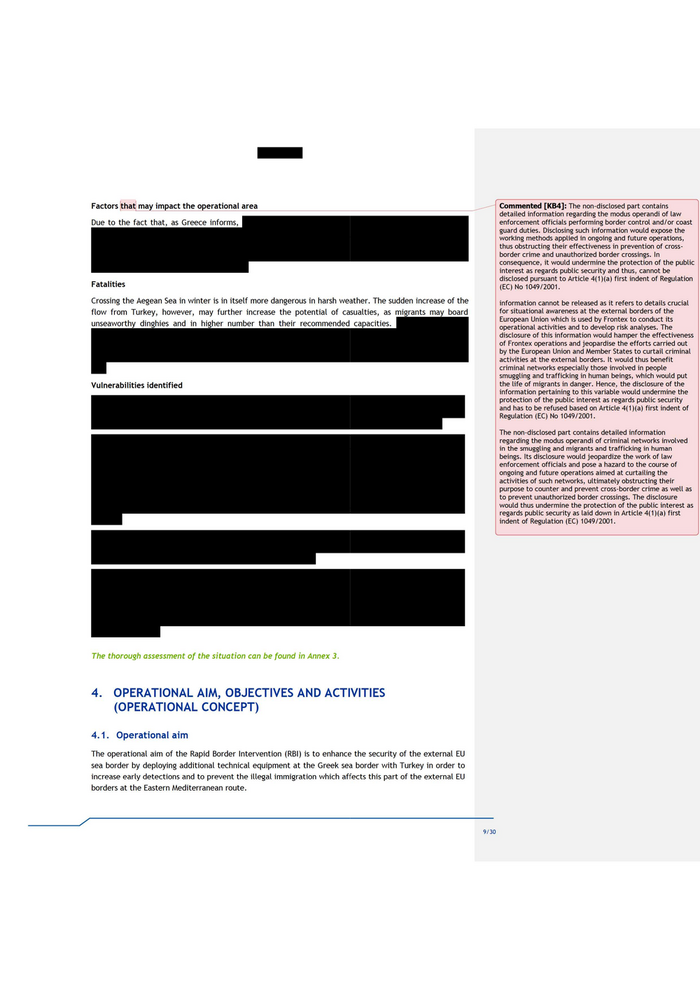
To increase early detections and to prevent illegal border crossings and to ensure that no life may be jeopardised at sea, all maritime and aerial assets should patrol in the most effective way, thus ensuring the early detection of migrants’ vessels. The operational aim will be implemented in full compliance with the relevant EU and international law, guaranteeing the protection of the fundamental rights in particular the access to international protection and the compliance with the principle of non-refoulement and taking into account the recommendations of the Frontex Consultative Forum and the reports and observations of the Fundamental Rights Officer. 4.2. Operational objectives «e _Enhance border security e Technical and operational assistance in SAR «e _ Enhance operational cooperation ® _ Enhance collection and exchange of information «e _Identify possible risks and threats Detailed information regarding operational objectives is provided as Annex 4. 4.3. Operational activities (Operational concept) The objectives of the RBl will be achieved by combining different types of operational activities, particularly: « Border and pre-frontier surveillance at sea. «e _Supporting SAR operations. e _Preventing and detecting serious crime with a cross-border dimension that is committed or attempted at, along or in proximity of the external borders with the focus on migrant smuggling, trafficking in human beings, stolen vehicles, smuggling of drugs, weapons, document fraud and terrorism. « To support national authorities and EU agencies dealing with fisheries control and environmental protection in the frame of European cooperation in Coast Guard Functions activities. e _ Collection of information through operational activities. e Providing a clear and updated situational picture related to the RBl. «e _Supporting the identification of special needs of children, unaccompanied minors, persons with disabilities, victims of trafficking in human beings, persons in need of medical assistance, persons in need of international protection, and other persons in a particularly vulnerable situation. «e _Referring and providing initial information to persons who are in need of, or wish to apply for, international protection. «e _Facilitating the cooperation with Union agencies, bodies or international organizations, and Third Countries. The aforementioned activities will be implemented by the deployed technical equipment and human resources, under the control and command of the operational structures of the host MS. Data protection requirements for processing of operational personal data are defined in Annex 14. 4.3.1. Border surveillance Border surveillance shall be carried out by using technical equipment as follows: «e _ Aerial assets: detection / tracking / identification. «e Maritime assets: detections / tracking / identification / interception. + _Terrestrial assets: detection / tracking / identification / interception. MM 10/30
